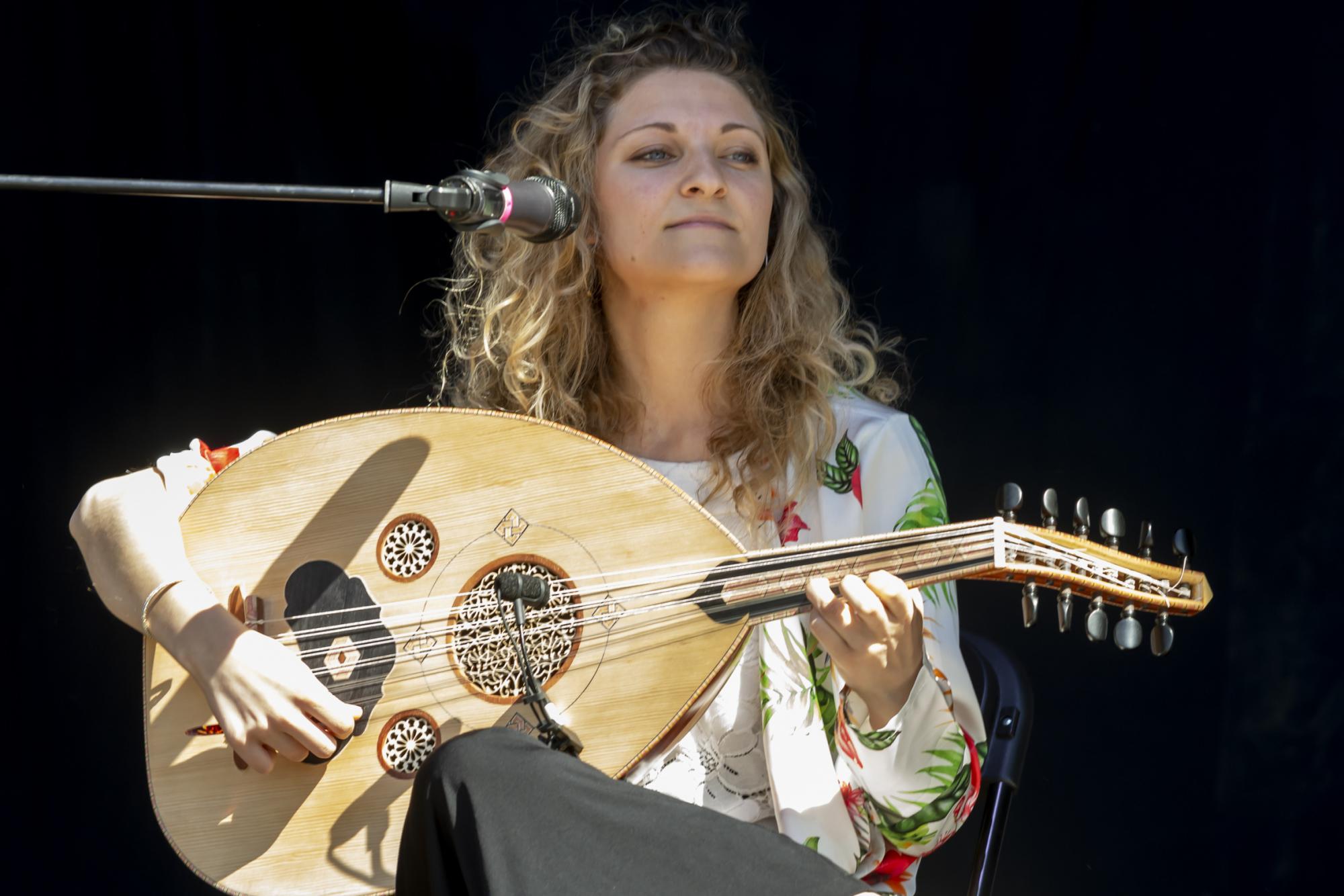American Oud Player Aliya Cycon Explores the Music of Andalucía in New Project

Aliya Cycon B.M. '16, M.M. '19
Image by Tato Baeza
In March 2012, a few months before she entered Berklee as an undergraduate, Aliya Cycon attended the annual Berklee Middle Eastern Festival. The theme of that year’s concert was “A Journey through Andalucía,” focusing on the connections between flamenco, Arabic, Mediterranean, and Balkan music. Watching the show, Cycon began to cry; it was the first time she’d ever had that reaction to a concert. Though it was impossible for her to know at the time, she was hearing her future.
Today, more than seven years later, Cycon B.M. ’16, M.M. ’19 is freshly graduated from Berklee’s Master of Music in Contemporary Performance (Production Concentration) program and is preparing for a November 24 concert in Valencia, Spain, with her band Aliya and the New Andalus, featuring flamenco master Sergio Martínez on cajón and Balkan jazz virtuoso Timotej Kotnik on trumpet—both faculty members at Berklee’s campus in Valencia—and local bassist Miguel Alvarez. The group released its debut EP in September.
In advance of the show, and on the cusp of a three-week trip to Tunisia to work with the educational project Tunisia88, Cycon talked about her journey from being a piano player from Massachusetts to an oud musician based in Valencia. Below is an edited and condensed version of that conversation.
You changed your principal instrument from the piano to the oud halfway through your undergraduate studies. What informed this decision?
I applied to Berklee as a piano principal. Then just a few months before I was supposed to attend my first semester, my dad takes me on a trip to Palestine. He wanted to go to Palestine to learn more about the conflict and the region, and so he brought me with him, and we just fell in love with Palestine together. We were just amazed by the culture, the hospitality, and the music. That’s where I first saw the oud with my own eyes.
A week or two after I got back from Palestine—and at this point I’m already accepted; I’m getting ready to attend Berklee—and they’re having their annual Middle Eastern music concert. I was just so moved by the music.
What do you love about the oud?
I love the range of it. The low open string, depending on the tuning, is like the same low C of a cello. So it really has this rich, low cello range, essentially. I love the way that it’s played with the plectrum, so there’s this sense in the oud that it’s a percussion instrument. You’re hitting it. I love the tamber because it’s an all-wooden instrument, so it’s very earthy, and I love that it’s fretless because you can have all these beautiful vibratos and melismas and, of course, the microtones, which have such a beautiful sound on the oud.
After getting your bachelor’s degree, you started performing as a cultural ambassador for the U.S. State Department in Tunisia, Jordan, and Kuwait. Why did you decide to go to Berklee’s graduate program in Valencia at this point?
I already knew that I wanted to learn more about flamenco and the Mediterranean world. Obviously, it’s a nice central region if I want to be connected to North Africa and the Middle East. And the program really spoke to me because it was all about exploring your instrument, collaborating, really expanding your musical horizons, and networking. I just felt like going there would get me closer to the very broad goals I had. I knew very early on that my thesis would be all about exploring Andalucía [and] had this understanding that Andalucía was the hotbed of North African and Arabic music, Muslim architecture and art and poetry, and flamenco.
How did the program help you?
It really took me out of my comfort zone with the instrument, because the oud always stays in its own world. It’s rare to find it outside of its idiom, and so it gave me a really good chance to play in keys that it’s not commonly played in. I feel like it gave me the tools to be able to play other genres and just open my mind with different techniques.
You’re in two groups, Aliya Cycon Project and Aliya and the New Andalus. How are they different?
Aliya Cycon Project has taken quite an evolution. The only time where I feel like [it] rebirths is where I do these international tours. I used to refer to it with the catchphrase “Arabic-inspired music,” and that was to not create a deception that I’m of Arabic roots or that I have the right to present myself as this Arabic-music expert. It has a lot more of the Arabic music idiom involved and a lot of the pieces are instrumental. Whereas in Aliya and the New Andalus I’m really putting myself out there as singer/oud player.
What’s new about the style of music that Aliya and the New Andalus is playing?
It’s taking the oud and then using the idiom that the oud brings in, which by default is going to sound Middle Eastern, but portraying it with a flamenco rhythm section—juxtaposing that—and then adding in a trumpet and that type of ornamentation. In that way, it’s basically using the Andalus geographic region as sort of a focal point, but then pulling from the cultures that once inhabited the Andalus, and then creating this new perspective. And, obviously, I’m American, so it’s sort of taking that outsider look at it.
Aliya and the New Andalus feels like a rite a passage for me. Because it’s like phase 2.0 of Aliya being an oud player.
The November 24 concert will be at Veles e Vents, Marina de Valencia, Carrer del Moll de la Duana, Valencia. Doors open at 7:30 p.m. Tickets are 6 euros in advance; 8 euros at the door.
